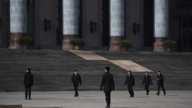【新唐人2013年02月19日讯】习近平将在3月接任国家主席职务,按照国际惯例,新领导人上任后首次出访,一般代表着本国外交政策取向。因此,蛇年伊始,外交部长杨洁篪17号开始的对南非和俄罗斯的访问,被认为是为习近平3月份的出访“铺路”。
在目前国际和国内形势复杂多变的情况下,习近平为什么可能选择俄罗斯作为上任后,首个出访的国家呢?对此,评论人士有着不同的分析和解读。
前中国大陆史学教授刘因全分析,将俄罗斯作为出访第一站,习近平可能有三方面考量。
前中国大陆史学教授刘因全﹕“第一就是日本问题,中国为了对付日本,就会考虑加强和俄国的同盟。第二个问题是朝鲜核武器问题,他有可能谋求和俄国共同向朝鲜施加压力。第三个问题就是越南问题,习近平很可能希望俄国减少对越南的军事支持,这样在南海问题上,中国会比较有力的向越南施加压力。”
时政评论家蓝述则认为,将俄罗斯作为首访国,背后可以看出习近平和军方微妙的关系。因为习近平要想稳定中共的统治,就必须获得军队的绝对领导权。为了进一步讨好中共军队里鹰派的势力,习近平在一系列政策上,都选择向鹰派妥协。
时政评论家蓝述﹕“向鹰派妥协势必带来在外交政策上,他更加趋于中共党内这些鹰派的政策,比如和俄罗斯联合,然后在太平洋周边地区和美、日、韩这些自由世界的盟国进行对抗,这很可能会成为一个选项。”
中国媒体报导,习近平曾在1月会见俄罗斯联邦安全会议秘书时表示,对俄关系是中共外交优先方向。另一方面,普京在去年5月再度当选俄罗斯总统后,外交策略也向东方倾斜。面对美国重返亚太的策略,中俄是否有可能重新结盟?
蓝述﹕“中国目前国内有非常强烈的要求民主、改革的声音,而俄国它已经是一个初步民主成型的国家,虽然普京他想往回走,但是不一定能走的成。所以,这种结盟能否成为事实,还需要时间来证实。”
作为一个前共产主义国家,俄罗斯民主进程起步时间不长,普京也被认为是有专制倾向的领导人。但蓝述认为,俄罗斯的民众绝对不会允许共产党重新回到统治地位,因此中俄即使联盟,也不再是当年“共产国际”时代,两个集权国家的结盟。
蓝述﹕“中俄最后的联盟,能否成为集权对自由世界的对抗,我觉得这种可能性不大。俄罗斯既然已经成为一个民主国家,它可能会在一定的利益问题上和中国结盟,但不见得会结成一个集权世界对付自由世界的联盟。”
《俄罗斯国际新闻通讯社》18号引述消息人士的话说,习近平将在3月25号到27号期间,在南非召开的“第五届金砖国家首脑会议”之前,首访俄罗斯。俄罗斯驻中国大使拉佐夫不久前接受俄罗斯媒体采访时指出,如今俄中两国间的伙伴关系不再是依靠共同的理想,而是基于共同的利益。
采访/刘惠 编辑/尚燕 后制/萧宇
Russia, Xi Jinping’s First International Trip as New State President
In March, Xi Jinping will become the new president of state,
Chairman of the Chinese Communist Party (CCP).
According to international practice, a new state head’s first
international trip represents the state foreign policy orientation.
On February 17, CCP foreign Minister Yang Jiechi started
his visit to South Africa and Russia.
It was considered as “paving the way” for
Xi’s March visit to Russia.
In a complex and changing context in China and overseas,
why did Xi Jingpin choose Russia as his first visit?
Political observers have different interpretations of it.
Liu Yinquan, former history professor in China, reasons that
there are three factors.
Liu Yinquan says : “Firstly, it’s due to Japan.
In order to confront Japan, the regime is considering
strengthening China’s alliance with Russia.
Secondly, it’s out of concern about
North Korea’s nuclear issue.
The CCP may seek to ally with Russia to
jointly pressure N. Korea.
The third factor is related to Vietnam, Xi is likely to
see Russia cut it’s military support to Vietnam.
That will help the CCP to exert pressure on Vietnam
over the South China Sea issue."
Critic Lan Shu says that making Russia his first destination
gives away Xi’s delicate relations with the military.
This is because Xi has to gain absolute power over the army,
in order to stabilize CCP rule.
In order to further curry favor with the CCP military hawks,
Xi thus has to yield to on a series of policies.
Lan Shu: “Conceding to the military hawks will bring him
closer to agreement with the hawks policies.
Such as forming an alliance with Russia, to compete with
those allied democratic nations of U.S., Japan,
and South Korea in the Pacific Rim area.
This option is very likely to become a reality.”
Reportedly, when meeting with the Russian Security Council
Secretary in January, Xi Jinping said that China prioritizes relations with Russia.
In May 2012, Vladimir Putin was re-elected President.
Since then, the country’s foreign policy is also Eastward.
At a time of the US’ return to the Asia-Pacific region,
is it possible to see a China-Russia re-alliance?
Lan Shu: “Currently, there’s a very strong voice inside China
demanding democracy and political reform.
But Russia has already tasted democracy.
Putin still wants to backtrack, but he may not make it.
So whether this alliance can materialize or not will perhaps
not become clear for quite some time.”
Russia hasn’t experienced a long democratic process
since it ended the communist rule.
Putin is also widely deemed to be authoritarian-leaning.
Lan Shu doesn’t think the Russian people will permit
Russia to fall under communist rule again.
Therefore, Lan says that even if there is a Sino-Russian
alliance, it won’t be like that formed in the past, under two
totalitarian regimes.
Lan Shu: “It’s less likely that a Sino-Russian alliance will be
formed a totalitarian power to confront the free world, I think.
Since Russia has become a democratic country, it may ally
with China on some issues concerning its interests.
It’s not likely that the two will form a totalitarian power
to resist the democratic alliance.”
On February 18, a Russian international news agency
quoted sources, saying that
Xi Jinping will make his first visit to Russia
before attending the upcoming fifth BRIC Summit.
Reportedly, Sergey Razov, Russia’s ambassador to China,
recently told Russian media that
the Russia-China partnership is no longer based on
common ideology, but on common interests.



























